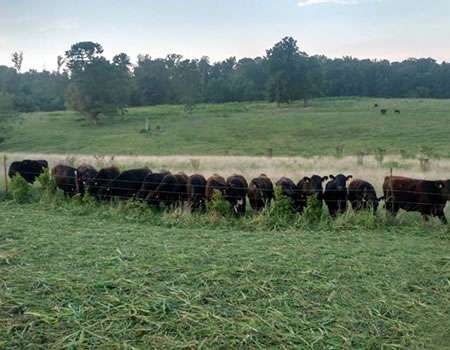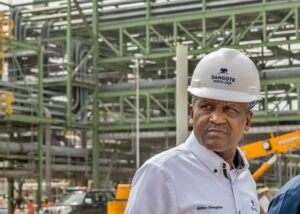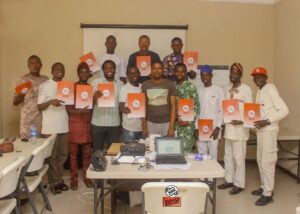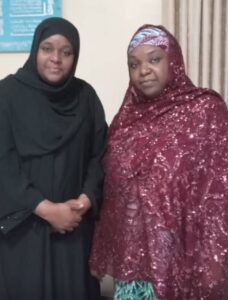ASSOCIATE Research Professor, Jean Feugang, of Department of Animal and Dairy Sciences, Mississippi State University, U.S. has disclosed that there are lot of challenges in livestock production in Nigeria which can be confronted through research.
In a remarks during his visit to Animal Genetic Resources (AnGR) Research Group, NABDA, Nigeria Feugang said “I came to Nigeria to explore what is in the country’s AnGR, to see how I can implement the kind of research I do in U.S. with what you have here, with the goal to develop a strong collaboration for improved animal reproduction in the country”.
He lamented that there are lot of challenges in livestock production in Nigeria but we have to start from somewhere and our interventions must have direct impact on the producers.
“With the motivation I have seen, from the farmers and different institutions in the meeting, we will make a change at the end”.
“This is part of our international engagement and also an invitation supported by National Biotechnology Development Agency (NABDA), we are working on MOU with the goal to develop more productive research where joint grant submission will be done to generate more funding for research to continue,” He explained.
He further explained that with the application of this new technology in livestock production, it will change the traditional agriculture and once we have the change, we will be able to move forward.
In his remarks, Project Lead, AnGR Nigeria, Dr. Popoola Mustapha said “in Nigeria the maximum of what we get from a dairy cow during the wet season with abundance pasture is between 0.7-2 kg of milk, while globally the average is 20kg per day. The best performing dairy cow worldwide last year produced 67 kg of milk per day!”.
“The developed nations are sustainably managing their Animal Genetic Resource (AnGR) with the compliment of deploying precision breeding biotechnologies.
“Animals are bred on purpose with uniform phenotypes however, the Nigeria case is different as we don’t even know much about the genetic resources of our livestock species, we know very little about what we are rearing hence we need to use biotechnology to characterize and know what we have.
“When we are talking about animal feed, our animals are roaming about on the roads feeding on plants with little or no nutrients to meet the daily dietary needs ”, he disclosed.
He lamented that “Internationally, animals are fed with what they require for optimal performance because what animals need during pregnancy is different from what they need for growth and maintenance. The dietary requirement for dairy animal is equally different from that of meat purpose breeds, but here in Nigeria, all animals eat the same thing. This is negligence from us but we cannot be talking about the challenges without proffering solutions”.
“We know our challenges in animal breeding, we want to use science to solve those challenges, there could be other reasons to the myriad of problems in livestock sub sector but for us we belief that through science a lot of value can be added ”, he added.
Furthermore, he said “We have diverse genetic resources in Nigeria, we need to work on the poor genetic resources by improving them, we need to work on the feed resources to sustain the genetic resources in vivo and we need to work on the husbandry models to mitigate climate change challenges across the economically important livestock value chain. This is the thrust of our researches at the centre of Animal Re(Productivity) and Biotechnology(CARB) ,NABDA.
“We are working together with other strategic stakeholders like Federal Ministry of Agriculture and Rural Development, Nigeria Institute of Animal Science and Breeders Associations to solve the problems in the livestock sub sector and support our vision.
“For us we are looking at solving the problem of farmers and herders crisis because we belief science can do a lot”.
He disclosed that “the equipment brought into Nigeria by Associate Research Professor Feugang can be used in Africa for our animal’s selection for breeding and health management through “thermo-imaging”.
“We are trying to experiment and model it and if it is adaptive, then we can deploy it to support the farmers to do selective breeding. We need to move to precision breeding.
The Chairman Miyetti Allah Cattle Breeders Association of Nigeria, Federal Capital Territory Chapter Yahaya Isah, said “it is a good idea and a good innovation that will take us somewhere, we have long expected this idea, it is way forward, other advanced countries have since adopted the new technology in livestock production, but we are still behind, we stand to give it our best.
According to him, “It is a welcome development, but our concern now is the transition, because our people have been used to ancient idea of livestock production. It is difficult to meet our people in an organised environment, because we move from one place to the other, we need government intervention to have grazing areas where we can do ranching”.
He explained “there will be drastic change in livestock production both domestic and commercial purpose, we should be able produce a product that will be marketable. Livestock products are a huge source of revenue for other countries and we are hopeful that Nigeria will generate revenue from the livestock too”.










